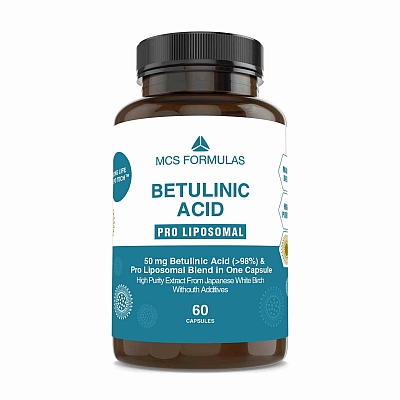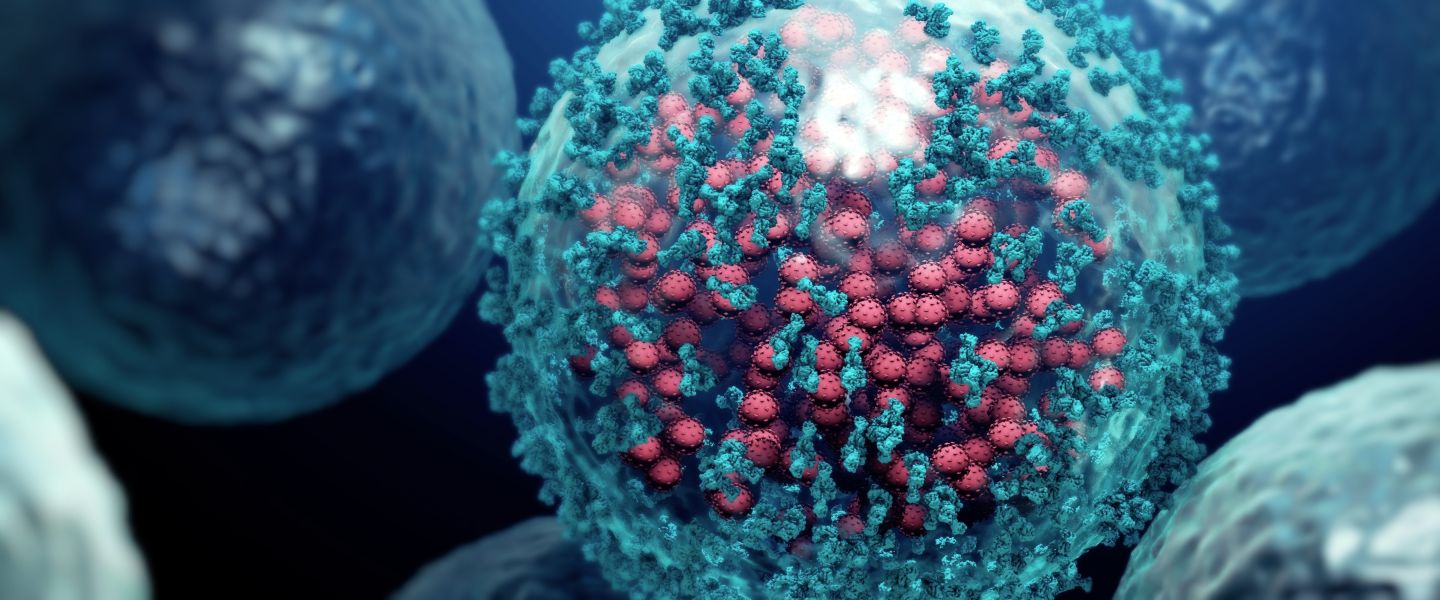Betulinic Acid Modulates Multiple Cellular Pathways, Hormone Signaling, and Cancer Stem Cell Signaling, Inducing Apoptosis, Regulating Cell Cycle and Angiogenesis, and Preventing Invasion and Metastasis of Cancer Cells - and More
Betulinic Acid Inhibits HIF-1a and VEGF
BA has been shown to inhibit the expression of hypoxia-inducible factor 1α (HIF-1α) and vascular endothelial growth factor (VEGF) in human endometrial adenocarcinoma cells [19]. It has also been demonstrated to suppress STAT3 and HIF-1α, thereby inhibiting HIF-1α and VEGF expression in hypoxic PC-3 prostate cancer cells[20]. Moreover, BA has been found to activate the proteasome and suppress HIF-1α accumulation in hypoxic cervical cancer cells[21]
Betulinic Acid and Metabolic Pathways in Cancer
In various studies, BA has been found to suppress aerobic glycolysis in breast cancer cells, inhibiting lactate production, glucose uptake, and extracellular acidification rate (ECAR), as well as suppressing related proteins including c-Myc, lactate dehydrogenase A (LDH-A), and p-PDK1/PDK1 [2, 3]. Moreover, BA nano-liposomes have been shown to significantly suppress the proliferation and glucose uptake of colorectal cancer cells by regulating potential glycolysis and fatty acid metabolism targets and pathways, inducing cellular apoptosis [4]. Recent research from 2021 has indicated that BA also elicits a dose-dependent inhibitory effect on both mitochondrial respiration and glycolysis in A375 human melanoma cells [5].
Betulinic Acid Primes for Ferroptosis
Research has shown that BA has the capacity to significantly impede the growth and migration of liver cancer cells [6]. The same study also concluded that BA can induce ferritinophagy, promoting the expression of ferritinophagy-related proteins and causing ferritinophagy-related phenomena in vivo and in vitro to inhibit tumor growth.
Betulinic Acid Modulates Estrogen Signalling
BA extracted from Prunella vulgaris inhibits estrogen signalling[22] by depleting estrogen receptor alpha, showing potential as therapeutic agents against estrogen-dependent tumours.
Betulinic Acid Modulates Androgen Signalling
Betulinic acid derivatives have been found to have modulatory activity on the androgen receptor pathway, as well as cytotoxicity towards cancer cells. Furthermore, these derivatives disrupt mitochondrial functions, which may potentially synergize for antitumor activity[23].
Betulinic Acid Research for Immunomodulation
Betulinic acid's immunomodulatory activity is considered promising, given its capacity to modulate several cell types of the immune system, including macrophages and lymphocytes, and its anti-inflammatory activity in various inflammation models. Additionally, BA has been shown to reduce the number of myeloid-derived suppressor cells (MDSCs) in the lungs and tumors [24].
Betulinic Acid Research for Breast Cancer Bone Metastasis and Treatment Side-effects
Orally administered betulinic acid inhibited cancer-associated bone diseases in mice and may have the potential to prevent bone loss in patients with bone metastases and cancer treatment-induced estrogen deficiency. BA reduced PTHrP production in human metastatic breast cancer cells, blocked RANKL/OPG ratio in PTHrP-stimulated human osteoblastic cells and inhibited RANKL-induced osteoclastogenesis in bone marrow macrophages. BA also decreased bone resorption by suppressing osteoclast activity[25].
Betulinic Acid Research for Lung Metastasis
In a caudal vein model, BA also obviously suppressed TNBC tumour pulmonary metastases. BA might be a potential agent for inhibiting the growth and metastasis of breast cancer[24].
Betulinic acid demonstrated synergistic effects with various anticancer chemotherapeutics. Non- malignant cells and normal tissues are not affected by betulinic acid.
Betulinic Acid and Paclitaxel
BA exerts potent anti-tumor effects on paclitaxel-resistant human lung carcinoma cells (H460) via G2/M phase cell cycle arrest and induction of mitochondrial apoptosis [26].
Betulinic Acid and Cisplatin
BA enhanced the chemical sensitivity of oesophageal cancer cells to cisplatin by inducing cell pyroptosis and reducing cell stemness[27].
Betulinic Acid and 5-FU
Sequential treatment with BA followed by 5-fluorouracil shows synergistic cytotoxic activity in ovarian cancer cells[28]
Betulinic Acid and Gemcitabine
Betulinic acid, a major therapeutic triterpene of Celastrus orbiculatus Thunb., acts as a chemosensitizer of gemcitabine by promoting Chk1 degradation[29]
Betulinic Acid and Sorafenib
Sorafenib in Combination with Betulinic Acid Synergistically Induces Cell Cycle Arrest and Inhibits Clonogenic Activity in Pancreatic Ductal Adenocarcinoma Cells [30]
Betulinic Acid and Doxorubicin
Doxorubicin combined with betulinic acid or lonidamine in RGD ligand-targeted pH-sensitive micellar system for ovarian cancer treatment[31]
Betulinic Acid + Ligustrazine (BA-12) as an anti-angiogenesis therapy support
Research on antitumor activities of BA-12 using T24 cell line being human urinary bladder cancer; high-grade and invasive. These findings indicate that GSH metabolism activation induced by BA-12 can induce excessive ROS production, and affect the antioxidant defence system and glycerophospholipid metabolism, and synergistically inhibit angiogenesis.
Our study group’s Ligustrazine discussion thread link is under L in the A-Z directory.
Betulinic Acid Research on Cancer Stem Cell Pathways
NF-κB pathway
Research on BA and the NF-κB pathway concluded inhibits cell proliferation and migration in gastric cancer[8]. , induces ROS-Dependent Apoptosis and S-Phase Arrest by Inhibiting the NF-κB Pathway in Human Multiple Myeloma and in Prostate cancer BA suppresses TNFα-induced NF-κB Activation and Induces Apoptosis[9,10].
Notch pathway
3-O-(E)-p-Coumaroylbetulinic acid (CB) a plant-based terpenoid derived from betulinic acid inhibits Notch signalling pathway in breast cancer cells[11] and mammosphere.
PI3K/AKT/mTOR pathway
Liver cancer research[12] concluded that BA induces autophagy-mediated apoptosis through suppression of the PI3K/AKT/mTOR signalling pathway and when researchers explored the potential mechanism by which betulinic acid inhibited pancreatic cancer, they found that betulinic acid induces apoptosis by specifically through targeting mTOR signalling[13].
JAK- STAT pathway
In breast cancer cells[14] BA inhibited the activation of stat3 and FAK which resulted in a reduction of matrix metalloproteinases (MMPs), and increase of the MMPs inhibitor (TIMP-2) expression. BA also suppressed STAT3 activation pathway in human multiple myeloma cells[15] and prostate cancer cells[16]
TGF/ SMAD pathway
Gastric cancer research results indicated that BA inhibited TGF-β/Smad2/3 signalling, TGF-β1 secretion, and OCT4 expression in a dose-dependent manner and is regarded as a promising reagent in clinical combination therapy[17].
Hedgehog pathway
Research shows that induction of apoptosis and inhibition of hedgehog signalling are important features of the anti-tumorigenic effect of BA in Rhabdomyosarcoma[18] Use of BA in a multimodal therapy for this highly aggressive paediatric cancer is advised (in the study).
Bioavailable Betulinic Acid
Betulinic acid (BetA) has demonstrated broad efficacy in vitro against prevalent cancer types, including lung, colorectal, prostate, cervix, and breast cancer, melanomas, neuroblastomas, and leukemias. However, due to its weak hydrosolubility, studying BetA's efficacy in vivo and developing a pharmaceutical formulation has been challenging. To overcome this, a liposome formulation of BetA was developed and tested in mice. The intravenous liposomal delivery system resulted in a reduction in tumor growth of over 50% compared to control treatments, leading to enhanced mouse survival. Oral administration of the liposomal formulation of BetA also slowed tumor growth, and no signs of systemic toxicity were observed. These findings suggest that liposomes are an efficient formulation vehicle for BetA, enabling its preclinical development as a nontoxic compound for the treatment of cancers.
Dosing Notes Betulinic Acid
This mouse study provides insight into a potentially effective dosing regimen for betulinic acid. In a subcutaneous mouse model using 4T1 cells (metastatic breast cancer cells), a daily dose of 10mg/kg of betulinic acid for 21 days was found to reduce tumor growth and weight, as well as the number of lung metastatic nodules. Based on this animal study, a 60kg person would require approximately 50mg of betulinic acid (I used this calculator). Since MCS formulas offer a liposomal formulation of 50mg betulinic acid, it may be a suitable option for human use.
Until very recently Betulinic Acid was simply not available to cancer patients in a bioavailable formula and only being used in a research context. Today thanks to MCS formulas patients and practitioners can access a bioavailable Betulinic Acid in a 50mg liposomal formula. This is the HIGEST dose of Betulinic Acid with MAXIMIZED ABSORPTION … all in One Capsule. Learn more here

Learn more about MCS formulas - Liposomal Pro Betulinic Acid
Until very recently Betulinic Acid was NOT available to cancer patients in a bio-available formula and only being used successfully in a research context. Today thanks to MCS, patients and practitioners can access MCS formulas bioavailable Betulinic Acid in a 50mg liposomal formula.
* MCS offers ULTRAFAST WORLDWIDE SHIPPING with FedEx and UPS
** MCS are a SOCIAL ENTERPRISE - see the We Donate 50% program
[1] Discovery of betulinic acid as a selective inhibitor of human melanoma that functions by induction of apoptosis. Pisha, E et al. Nature medicine vol. 1,10 (1995): 1046-51. https://doi.org/10.1038/nm1095-1046
[2] Betulinic Acid Suppresses Breast Cancer Metastasis by Targeting GRP78-Mediated Glycolysis and ER Stress Apoptotic Pathway. Yifeng Zheng, Pengxi Liu, Neng Wang, Shengqi Wang, Bowen Yang, Min Li, Jianping Chen, Honglin Situ, Meiqi Xie, Yi Lin, Zhiyu Wang. Oxidative Medicine and Cellular Longevity, vol. 2019, Article ID 8781690, 15 pages, 2019. https://doi.org/10.1155/2019/8781690
[3] Betulinic acid suppresses breast cancer aerobic glycolysis via caveolin-1/NF-κB/c-Myc pathwayLin Jiao, Shengqi Wang, Yifeng Zheng, Neng Wang, Bowen Yang, Dongmei Wang, Depo Yang, Wenjie Mei, Zhimin Zhao, Zhiyu Wang,, Biochemical Pharmacology, Volume 161, 2019, Pages 149-162,ISSN 0006-2952, https://doi.org/10.1016/j.bcp.2019.01.016.
[4] Effects and mechanisms of fatty acid metabolism mediated glycolysis regulated by betulinic acid loaded nanoliposomes in colorectal cancer. Wang, G., Yu, Y., Wang, Y. Z., Zhu, Z. M., Yin, P. H., & Xu, K. (2020). Oncology reports, 44(6), 2595–2609. https://doi.org/10.3892/or.2020.7787
[5] Assessment of Betulinic Acid Cytotoxicity and Mitochondrial Metabolism Impairment in a Human Melanoma Cell Line. Coricovac D, Dehelean CA, Pinzaru I, Mioc A, Aburel O-M, Macasoi I, Draghici GA, Petean C, Soica C, Boruga M, Vlaicu B, Muntean MD. International Journal of Molecular Sciences. 2021; 22(9):4870. https://doi.org/10.3390/ijms22094870
[6] Betulinic acid inhibits growth of hepatoma cells through activating the NCOA4-mediated ferritinophagy pathway. Zhiru Xiu, Yilong Zhu, Shanzhi Li, Yaru Li, Xia Yang, Yue Li, Gaojie Song, Ningyi Jin, Jinbo Fang, Jicheng Han, Yiquan Li, Xiao Li, Journal of Functional Foods, Volume 102, 2023, 105441, ISSN 1756-4646, https://doi.org/10.1016/j.jff.2023.105441.
[7] Biochemical and mitochondrial membrane potential changes relating to betulinic acid-mediated anticancer activity in murine ascites Dalton's lymphoma. Anamika Bhaumik, Atanu Bhattacharjee, Surya Bali Prasad, ,Phytomedicine Plus,Volume 2, Issue 1,2022,100211,ISSN 2667-0313, https://doi.org/10.1016/j.phyplu.2021.100211.
[8] Chen, X., Yuan, X. N., Zhang, Z., Gong, P. J., Yin, W. N., Jiang, Q., ... & Zhang, J. W. (2020). Betulinic acid inhibits cell proliferation and migration in gastric cancer by targeting the NF-κB/VASP pathway. European Journal of Pharmacology, 889, 173493.https://doi.org/10.1002/cbf.3537
[9] Betulinic acid induces ROS-dependent apoptosis and S-phase arrest by inhibiting the NF-κB pathway in human multiple myeloma. Shen, M., Hu, Y., Yang, Y., Wang, L., Yang, X., Wang, B., & Huang, M. (2019). Oxidative Medicine and Cellular Longevity, 2019.https://doi.org/10.1155/2019/5083158
[10] Betulinic acid suppresses constitutive and TNFalpha-induced NF-kappaB activation and induces apoptosis in human prostate carcinoma Rabi T, Shukla S, Gupta S. Mol Carcinog. 2008 Dec;47(12):964-73. doi: 10.1002/mc.20447. PMID: 18444250; PMCID: PMC2864721.https://doi.org/10.1002/mc.20447
[11] Betulinic acid possess anticancer activity and inhibit Notch signaling pathway in breast cancer cells and mammosphere. Kushwaha PP, Singh AK, Shuaib M, et al. 3-O-(E)-p-Coumaroyl. Chemico-biological Interactions. 2020 Sep;328:109200. DOI: 10.1016/j.cbi.2020.109200. PMID: 32702347.
[12] Betulinic acid induces autophagy-mediated apoptosis through suppression of the PI3K/AKT/mTOR signaling pathway and inhibits hepatocellular carcinoma. Liu W, Li S, Qu Z, Luo Y, Chen R, Wei S, Yang X, Wang Q. Am J Transl Res. 2019 Nov 15;11(11):6952-6964. PMID: 31814899; PMCID: PMC6895530.https://www.ncbi.nlm.nih.gov/pmc/articles/PMC6895530/
[13] Chemopreventive effect of Betulinic acid via mTOR -Caspases/Bcl2/Bax apoptotic signaling in pancreatic cancer. Guo, Y., Zhu, H., Weng, M. et al. BMC Complement Med Ther 20, 178 (2020). https://doi.org/10.1186/s12906-020-02976-7
[14] Betulinic acid impairs metastasis and reduces immunosuppressive cells in breast cancer models. Zeng, A. Q., Yu, Y., Yao, Y. Q., Yang, F. F., Liao, M., Song, L. J., Li, Y. L., Yu, Y., Li, Y. J., Deng, Y. L., Yang, S. P., Zeng, C. J., Liu, P., Xie, Y. M., Yang, J. L., Zhang, Y. W., Ye, T. H., & Wei, Y. Q. (2017). . Oncotarget, 9(3), 3794–3804. https://doi.org/10.18632/oncotarget.23376
[15] Betulinic acid suppresses STAT3 activation pathway through induction of protein tyrosine phosphatase SHP-1 in human multiple myeloma cells Manoj K. Pandey, Bokyung Sung, Bharat B. Aggarwal First published: 23 November 2009 https://doi.org/10.1002/ijc.25059
[16] Suppression of STAT3 and HIF-1 alpha mediates anti-angiogenic activity of betulinic acid in hypoxic PC-3 prostate cancer cells Shin, J., Lee, H. J., Jung, D. B., Jung, J. H., Lee, H. J., Lee, E. O., Lee, S. G., Shim, B. S., Choi, S. H., Ko, S. G., Ahn, K. S., Jeong, S. J., & Kim, S. H. (2011). . PloS one, 6(6), e21492. https://doi.org/10.1371/journal.pone.0021492
[17] Betulinic Acid Inhibits the Stemness of Gastric Cancer Cells by Regulating the GRP78-TGF-β1 Signaling Pathway and Macrophage PolarizationChen J-L, Tai Y-S, Tsai H-Y, Hsieh C-Y, Chen C-L, Liu C-J, Wu D-C, Huang Y-B, Lin M-W. . Molecules. 2023; 28(4):1725. https://doi.org/10.3390/molecules28041725
[18] Betulinic acid induces apoptosis and inhibits hedgehog signalling in rhabdomyosarcoma Eichenmüller, M., Hemmerlein, B., von Schweinitz, D., & Kappler, R. (2010). . British journal of cancer, 103(1), 43–51. https://doi.org/10.1038/sj.bjc.6605715
[19] Betulinic acid inhibits the expression of hypoxia-inducible factor 1α and vascular endothelial growth factor in human endometrial adenocarcinoma cells Karna, E., Szoka, L. & Palka, J.A. . Mol Cell Biochem 340, 15–20 (2010). https://doi.org/10.1007/s11010-010-0395-8
[20] Suppression of STAT3 and HIF-1 alpha mediates anti-angiogenic activity of betulinic acid in hypoxic PC-3 prostate cancer cellsShin, J., Lee, H. J., Jung, D. B., Jung, J. H., Lee, H. J., Lee, E. O., Lee, S. G., Shim, B. S., Choi, S. H., Ko, S. G., Ahn, K. S., Jeong, S. J., & Kim, S. H. (2011). . PloS one, 6(6), e21492. https://doi.org/10.1371/journal.pone.0021492
[21] Suppression of HIF-1α accumulation by betulinic acid through proteasome activation in hypoxic cervical cancer Kim, H. J., Cho, H. S., Ban, H. S., & Nakamura, H. (2020). Biochemical and biophysical research communications, 523(3), 726–732. https://doi.org/10.1016/j.bbrc.2020.01.031
[22] Inhibition of estrogen signaling through depletion of estrogen receptor alpha by ursolic acid and betulinic acid from Prunella vulgaris var. lilacina. Kim, H. I., Quan, F. S., Kim, J. E., Lee, N. R., Kim, H. J., Jo, S. J., ... & Inn, K. S. (2014). . Biochemical and biophysical research communications, 451(2), 282-287.
[23] Derivatives of betulinic acid act as modulators of the androgen receptor and report cytotoxicity towards cancer cell lines Srovnalova, A., Gurska, S., Urban, M., Sarek, J., Rehulka, J., Dzubak, P., & Hajduch, M. (2022). . Cancer Research, 82(12_Supplement), 1530-1530.https://doi.org/10.1158/1538-7445.AM2022-1530
[24] Betulinic acid impairs metastasis and reduces immunosuppressive cells in breast cancer models Zeng, A. Q., Yu, Y., Yao, Y. Q., Yang, F. F., Liao, M., Song, L. J., Li, Y. L., Yu, Y., Li, Y. J., Deng, Y. L., Yang, S. P., Zeng, C. J., Liu, P., Xie, Y. M., Yang, J. L., Zhang, Y. W., Ye, T. H., & Wei, Y. Q. (2017). . Oncotarget, 9(3), 3794–3804. https://doi.org/10.18632/oncotarget.23376
[25] Betulinic acid, a bioactive pentacyclic triterpenoid, inhibits skeletal-related events induced by breast cancer bone metastases and treatment Se Young Park, Hyun-Jeong Kim, Ki Rim Kim, Sun Kyoung Lee, Chang Ki Lee, Kwang-Kyun Park, Won-Yoon Chung, ,Toxicology and Applied Pharmacology,Volume 275, Issue 2, 2014, Pages 152-162,ISSN 0041-008X, https://doi.org/10.1016/j.taap.2014.01.009
[26] Betulinic acid exerts potent antitumor effects on paclitaxel resistant human lung carcinoma cells (H460) via G2/M phase cell cycle arrest and induction of mitochondrial apoptosis. Zhan, X., Li, J., Zhang, S., Xing, P., & Xia, M. (2018). Oncology Letters, 16, 3628-3634. https://doi.org/10.3892/ol.2018.9097
[27] Betulinic acid enhanced the chemical sensitivity of esophageal cancer cells to cisplatin by inducing cell pyroptosis and reducing cell stemness. Chen, J., Peng, R., Niu, Z., Zhou, H., & Kang, C. (2020). Annals of palliative medicine, 9(4), 1912–1920. https://doi.org/10.21037/apm-20-867
[28] Sequential treatment with betulinic acid followed by 5-fluorouracil shows synergistic cytotoxic activity in ovarian cancer cells. Wang, Y. J., Liu, J. B., & Dou, Y. C. (2015). International journal of clinical and experimental pathology, 8(1), 252–259. PMC4348889
[29] Betulinic acid, a major therapeutic triterpene of Celastrus orbiculatus Thunb., acts as a chemosensitizer of gemcitabine by promoting Chk1 degradation. Tao, L., Zhou, K., Zhao, Y., Xia, X., Guo, Y., Gao, Y., Peng, G., & Liu, Y. (2023). Journal of ethnopharmacology, 309, 116295. https://doi.org/10.1016/j.jep.2023.116295
[30] Sorafenib in Combination with Betulinic Acid Synergistically Induces Cell Cycle Arrest and Inhibits Clonogenic Activity in Pancreatic Ductal Adenocarcinoma Cells. Kutkowska, J., Strzadala, L., & Rapak, A. (2018). International journal of molecular sciences, 19(10), 3234. https://doi.org/10.3390/ijms19103234
[31] Doxorubicin combined with betulinic acid or lonidamine in RGD ligand-targeted pH-sensitive micellar system for ovarian cancer treatment. Jin, X., Zhou, J., Zhang, Z., & Lv, H. (2019). International journal of pharmaceutics, 571, 118751. https://doi.org/10.1016/j.ijpharm.2019.118751
[32] Betulinic acid delivered in liposomes reduces growth of human lung and colon cancers in mice without causing systemic toxicity. Mullauer, F. B., van Bloois, L., Daalhuisen, J. B., Ten Brink, M. S., Storm, G., Medema, J. P., Schiffelers, R. M., & Kessler, J. H. (2011). . Anti-cancer drugs, 22(3), 223–233. https://doi.org/10.1097/CAD.0b013e3283421035
[33] Betulinic acid impairs metastasis and reduces immunosuppressive cells in breast cancer models. Liu, J., Liu, Y., Zhang, H., Li, X., Cheng, Y., & Li, X. (2020). Journal of Cancer Research and Clinical Oncology, 146(10), 2487-2501. https://doi.org/10.18632/oncotarget.23376






